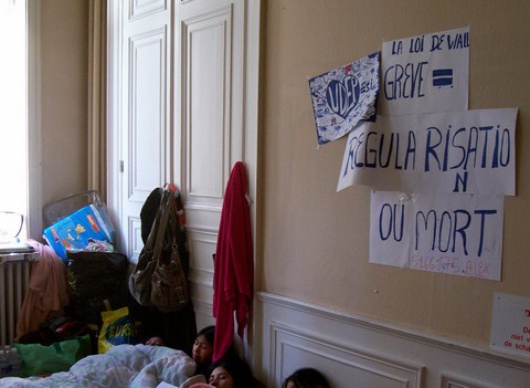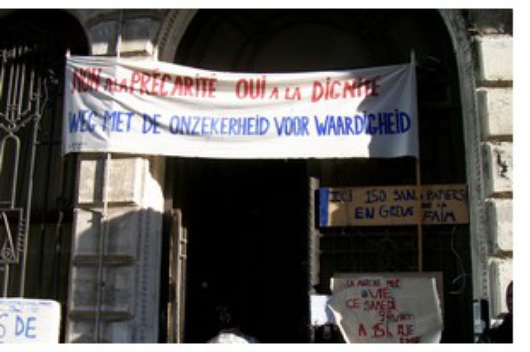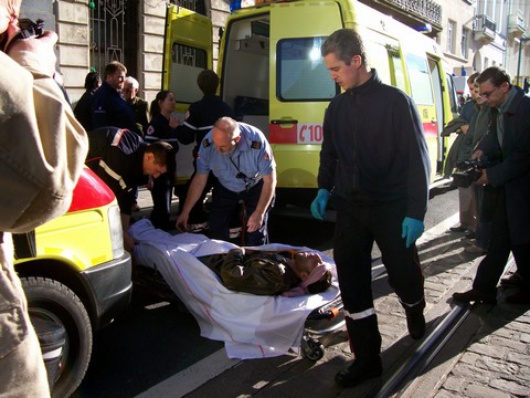Hunger strike for illegal immigrants in Belgium
Published on
Translation by:
Sarah Gray162 protestors have came to a provisional deal with the government - but they haven't eaten for 50 days
‘Regularisation ou mort! - citizenship or death!’ reads a banner representing the currently 162 illegal immigrants who are squatting in a property on 91, rue Royale, one of the main streets of Brussels which runs between the Palace of Justice and the gothic St Mary Church. They have been on hunger strike since 1 January. The Belgian interior minister agreed to give them a three-month stay, time to find a job in the meanwhile.
 Gli immigrati sans papiersHungry in Brussels (Photo: Giovanni De Paola)
Gli immigrati sans papiersHungry in Brussels (Photo: Giovanni De Paola)
The sans papier (‘people without documents’) came to the ‘capital of Europe’ from South America, Africa and Asia. They can stay in Belgium for three months, six months if they have health problems and if they find a job they can stay for one year. Inside the squat, we meet Elif (not her real name), a twelve year old girl whose family come from Turkey, and the one who speaks out during interviews. She goes to school with her two sisters and older brother; in Belgium every child has a right to education, as long as they have lived in the regions of Wallonia, Flanders or Brussels for at least two years.
 They speak fluent Flemish and French, unlike the older members of the group. Elif tells us that her mother is at the Rue Royale for the hunger strike because they can no longer accept being denied citizenship, as this means they can never get on with their lives in peace. 'I’m happy here,’ says Elif. ‘I speak Flemish very well because I go to Flemish school. If I had to go back to Turkey it would be very difficult for me to learn Turkish. So I want to stay in Belgium.’ Her decisiveness and intelligence is clear in her eyes.
They speak fluent Flemish and French, unlike the older members of the group. Elif tells us that her mother is at the Rue Royale for the hunger strike because they can no longer accept being denied citizenship, as this means they can never get on with their lives in peace. 'I’m happy here,’ says Elif. ‘I speak Flemish very well because I go to Flemish school. If I had to go back to Turkey it would be very difficult for me to learn Turkish. So I want to stay in Belgium.’ Her decisiveness and intelligence is clear in her eyes.
Two months of hunger strike
‘The hunger strike is our last chance,’ Elif suddenly says unexpectedly, speaking on behalf of her family and the otherl occupants of no. 91 Rue Royale.
‘Can your mother stay in Belgium?’ we ask her.
‘No ... unless she gets citizenship,’ she replies.
‘How do you survive? How can you afford to eat?’ we press.
‘I don’t understand the question,’ she hesitates, and mumbles something in Flemish; Elif may only be twelve but she is wise beyond her years. Whatever work her parents do is cash-in-hand and illegal. And Elif will not talk about it. When her excellent Flemish comes back to her, she goes on only that ‘it is very hard to pay the rent and buy food, my parents don’t work. It’s very hard because we don’t have any money.’
‘How long will you mother continue her hunger strike?’
‘Until we are granted citizenship.’
‘Do you think the hunger strike is the right thing to do?’
‘My father has already been on hunger strike, but it didn’t do any good. We are hoping that this time it will. There is nothing else we can do.’
 Even if you are just passing by the Rue Royale, you will often see ambulance sirens wailing, arriving to provide medial attention to the immigrants. The hunger strike is weakening their bodies, and a doctor is always on call. The protest has already gone on for two months, but those protesting are risking their lives because no other option is available to them. They prefer to live like this, waiting for the government, than continue leading a life of petty crime.
Even if you are just passing by the Rue Royale, you will often see ambulance sirens wailing, arriving to provide medial attention to the immigrants. The hunger strike is weakening their bodies, and a doctor is always on call. The protest has already gone on for two months, but those protesting are risking their lives because no other option is available to them. They prefer to live like this, waiting for the government, than continue leading a life of petty crime.
(Photo: Giovanni De Paola)
Translated from Immigrati in Belgio: «Regolarizzazione o morte»



